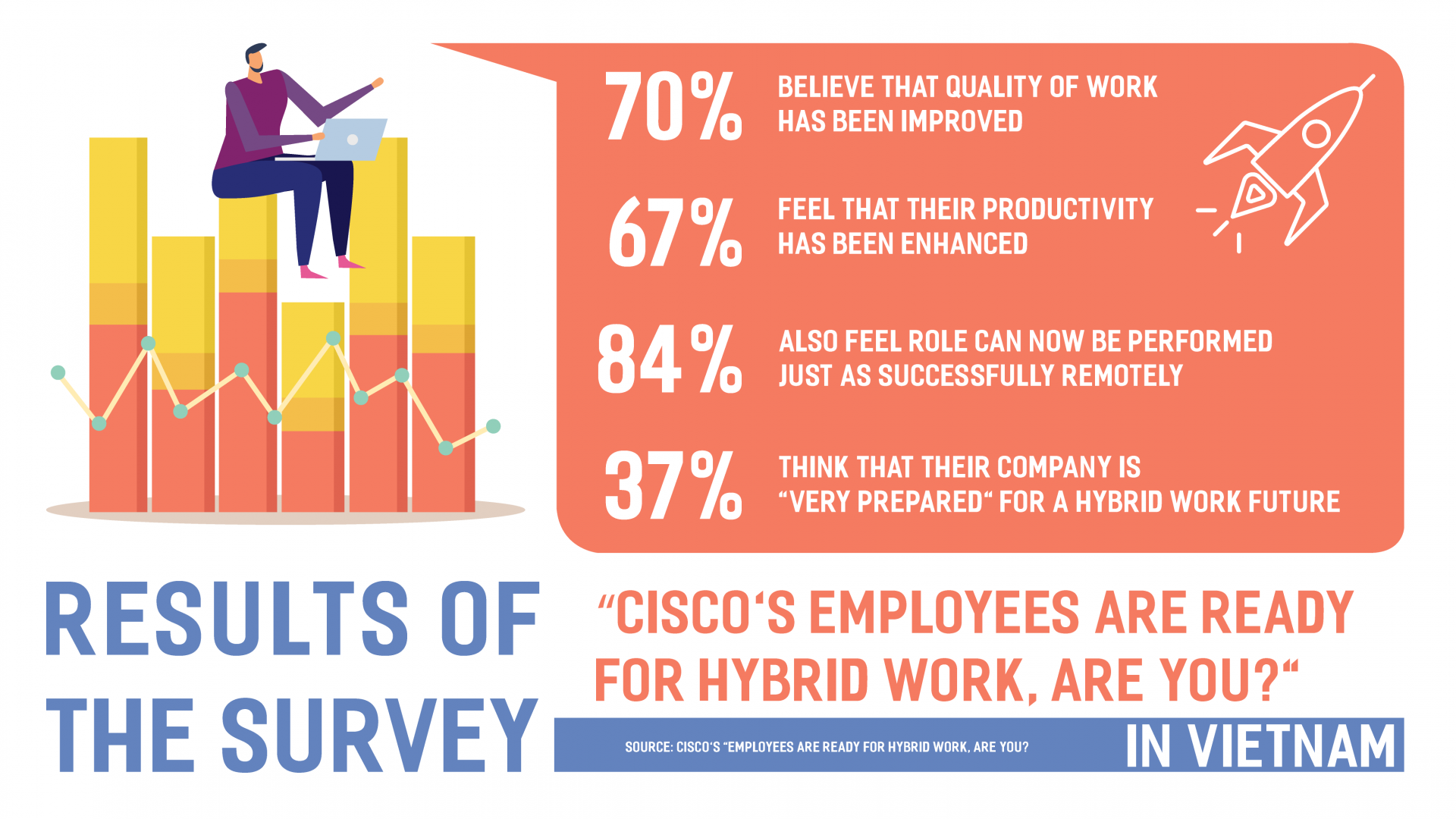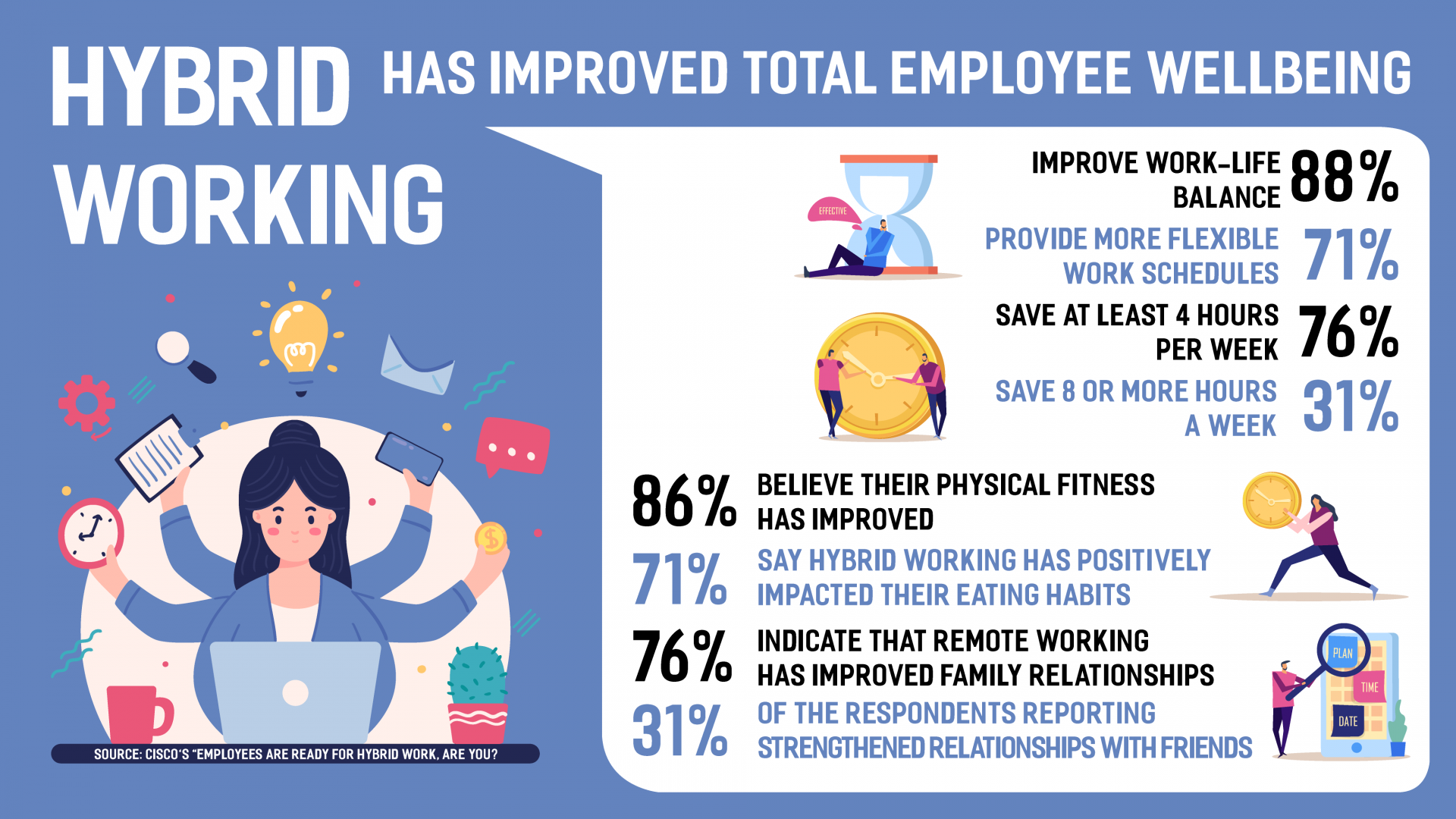Cisco released the report Employees Are Ready for Hybrid Work, Are You?
 |
| Cisco's Employees Are Ready for Hybrid Work, Are You? |
Surveys for Cisco's Employees Are Ready for Hybrid Work, Are You? were conducted with 28,000 employees from 27 countries, including over 1,050 respondents from Vietnam.
"The last two years have shown us that work is no longer where we go, but what we do. In a hybrid normal, employees and employers in Vietnam are experiencing tangible benefits from improved employee wellbeing to better productivity and work performance”, said the managing director of Cisco Vietnam Luong Thi Le Thuy.
“However, hybrid work is more than just supporting a safe office re-entry. Leaders need to rethink how to cultivate an inclusive culture, place employees – their experience, engagement, and wellbeing – at the centre, and modernise their networking and security infrastructure to provide a seamless, secure, and inclusive employee experience,” she added.
Cisco's research examined the impact of hybrid working on five categories of wellbeing-emotional, financial, mental, physical, and social well-being – with a good majority (85 per cent) saying hybrid and remote working has improved various aspects of their wellbeing.
In addition, nearly 89 per cent of Vietnamese respondents also say that their financial well-being improved, with their average savings reaching over $7,696 a year.
A sizeable 93 per cent ranked savings on fuel and/or commuting among their top three areas for savings, followed by decreased spending on food and entertainment at 75 per cent. More than 89 per cent believe they can maintain these savings over the long term and 82 per cent would take these savings into account when considering changing jobs.
 |
The future of work is hybrid, according to 76 per cent of employees in Vietnam, who say they want a combination of a remote and in-office hybrid working model in the future, compared to a fully remote (19 per cent) and fully in-office (4 per cent) experience.
However, there is uncertainty over how different work styles might impact inclusion and engagement. 72 per cent of Vietnamese respondents believe micromanaging behaviours had increased with hybrid and remote working. A lack of trust from managers that their employees can be productive has been a common thorn in their working experience.
Anupam Trehan, senior director of People & Communities at Cisco APJC said, “Trust has become a core tenet in our hybrid work normal, alongside flexibility and empathetic leadership. Our latest research indicates that more needs to be done to fully integrate hybrid work arrangements for employees, especially when it comes to building an inclusive culture powered by efficient technology infrastructure in this new world of working that employees clearly prefer. Leaders and companies need to commit to actions that go a long way to retain their people – listening, building trust, and leading with empathy, flexibility, and fairness."
At the same time, technology will remain critical to enabling a future with increasingly diverse and distributed workforces. 81 per cent of respondents believe having connectivity issues regularly is career-limiting for remote workers. As a result, 93 per cent say networking infrastructure is essential for a seamless working from home experience, but around 20 per cent say their company still need the right networking infrastructure.
About 83 per cent of respondents in Vietnam believe that cybersecurity is critical for making hybrid working safe, and 73 per cent say their organisation currently has the right capabilities and protocols in place. Only 72 per cent think that all employees across their company understand the cyber risks involved with hybrid work, and 79 per cent think that business leaders are familiar with the risks.
Juan Huat Koo, director of Cybersecurity of Cisco ASEAN said, “Technology is a key enabler of growth in the hybrid workplace, and it needs to be underpinned by end-to-end integrated security. Organisations should prioritise a robust security posture that underpins every digitalisation effort and ensure that cybersecurity is at the core of their technology architecture. Amid the expanded attack surface area today as more users and devices connect to corporate applications, organisations will need to bolster security and build greater vigilance through enabling secure access and protecting users and endpoints in the network and the cloud.”
What the stars mean:
★ Poor ★ ★ Promising ★★★ Good ★★★★ Very good ★★★★★ Exceptional
Themes: Digital Transformation
- Dassault Systèmes and Nvidia to build platform powering virtual twins
- Sci-tech sector sees January revenue growth of 23 per cent
- Advanced semiconductor testing and packaging plant to become operational in 2027
- BIM and ISO 19650 seen as key to improving project efficiency
- Viettel starts construction of semiconductor chip production plant
Related Contents
Latest News
More News
- State corporations poised to drive 2026 growth (February 03, 2026 | 13:58)
- Why high-tech talent will define Vietnam’s growth (February 02, 2026 | 10:47)
- FMCG resilience amid varying storms (February 02, 2026 | 10:00)
- Customs reforms strengthen business confidence, support trade growth (February 01, 2026 | 08:20)
- Vietnam and US to launch sixth trade negotiation round (January 30, 2026 | 15:19)
- Digital publishing emerges as key growth driver in Vietnam (January 30, 2026 | 10:59)
- EVN signs key contract for Tri An hydropower expansion (January 30, 2026 | 10:57)
- Vietnam to lead trade growth in ASEAN (January 29, 2026 | 15:08)
- Carlsberg Vietnam delivers Lunar New Year support in central region (January 28, 2026 | 17:19)
- TikTok penalised $35,000 in Vietnam for consumer protection violations (January 28, 2026 | 17:15)

 Tag:
Tag:




















 Mobile Version
Mobile Version